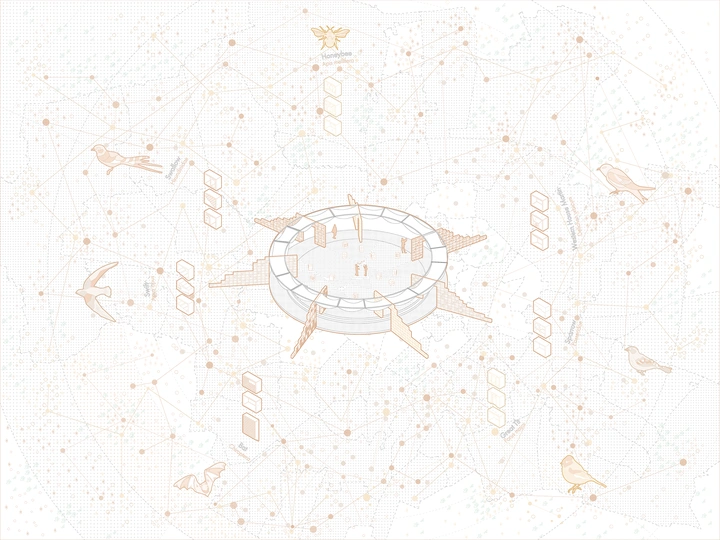UMWELT: Creating Caring Spaces

Linda El Zaher
We - Moira Burela and Linda El Zaher - are two emerging architects based in Munich, each with over three years of professional experience and an international background. We crossed paths during our studies at IE University in Madrid, where we completed our degree in Architecture and Urbanism. Both our thesis projects, aimed to question today’s physical, experiential, functional, and emotional reality, were published on Dezeen. https://www.dezeen.com/2021/07/13/ie-university-spain-school-show/amp/
We then worked at Henning Larsen, a renowned Danish studio, with a focus on cultivating desirable sustainable futures through design. United by common ideologies in the field with a curiosity to explore, we decided to collaborate on projects, one being Europan17, with the aim to challenge conventional architectural approaches and advocate for a holistic eco-centric perspective.
Linda El Zaher is a Lebanese/Bulgarian Architect with work experience in Barcelona, Milan, Prague and Munich. Her vision is to use design as a tool to shape environments that embrace social equality and diversity. She secured five Design Excellence Awards at IEU with projects in the realm of societal architecture and public spaces. She has been working as a Design Architect in multiple international studios where she participated in around 30 competitions and secured over 10 top prizes in projects varying in scales, programs, and sustainability concepts.
Moira Burela is a Bolivian architect with work experience in Santa Cruz, Bolivia, Madrid and Munich. Her recent work focuses on architecture’s agency across different scales, with a particular emphasis on how transdisciplinary collaboration can address contemporary issues and identify possible futures. In 2023 she was selected by Columbia University to be part of the cohort of respondents of AFFIRMATIONS, a series of discussions to interrogate how to think and redesign the built environment at the intersection of climate and ecological crisis.
Umwelt, a term coined by the German biologist Jakob von Uexküll, refers to the particular perspective of an organism: its internal model of the world, made up of its knowledge and perceptions. As stated by James Bridle, everything is unique and entangled. In a more-than-human world, it’s not only organisms which have an Umwelt, everything does.
In a Post-Anthropocentric world, it is crucial that we acknowledge the entanglements we are part of. We start with the idea that the world around us is made of interrelationships. Our intervention aims to bring non humans into the conversation, embracing the mystery of them and acknowledging the existence of more-than-human perspectives. Once we shift away from authoritarian thinking, we can create democratic spaces.
In the framework of an open space, the project introduces an ephemeral structure of seven walls made of breeding boxes, each one representing one species found in the city of Munich. Populations of building breeders in Bavaria have declined in recent years due to a loss of nesting places.
This pavilion not only allows the coexistence of different species, but also acts as a platform for debates, performances, and encounters. Sounds of birds, ecologists, biologists talking about those species, activities with children, creating awareness of this interconnectedness. Once finished, the breeding boxes will spread around the city to host their residents. Each piece will nurture communities of insects, butterflies, birds, bats, etc. For this we aim to collaborate with biologists and behavioural ecologists like the LBV in Munich.
These boxes would be crafted and sculpted intricately to highlight their equal importance to other architectural interventions. The project utilizes bio-based materials, specifically compressed earth boxes with local materials that have low impact and shorter supply chains.
As a future projection, we aim to develop these concepts into a reality through such public space interventions.